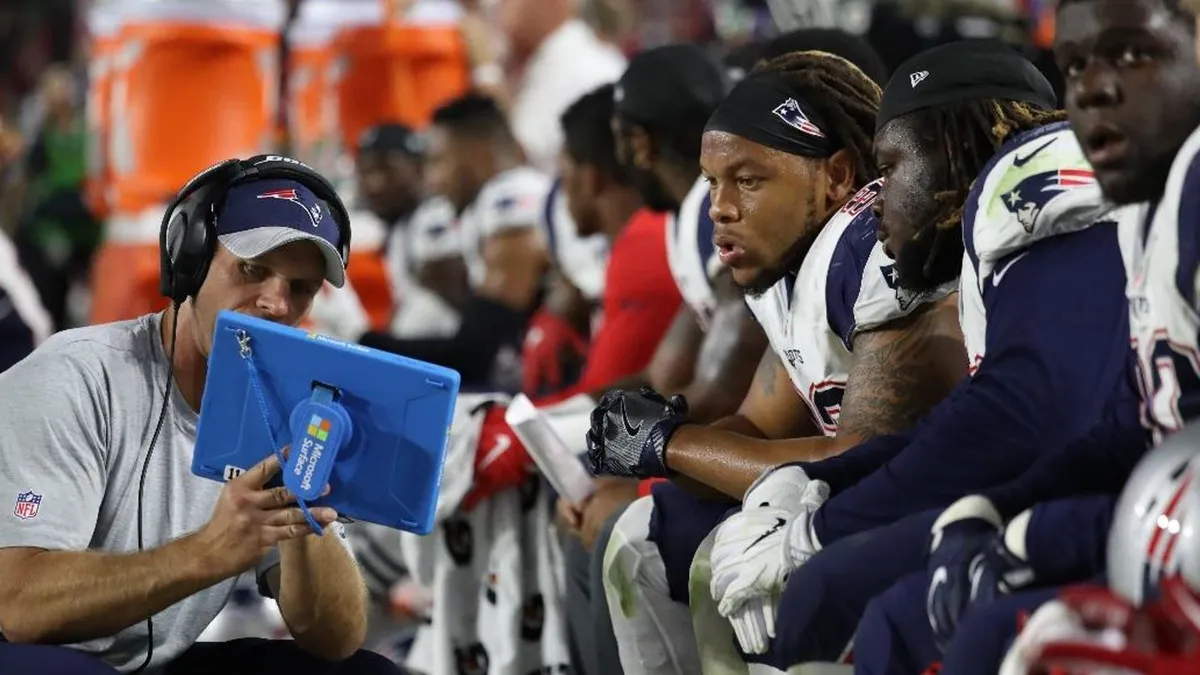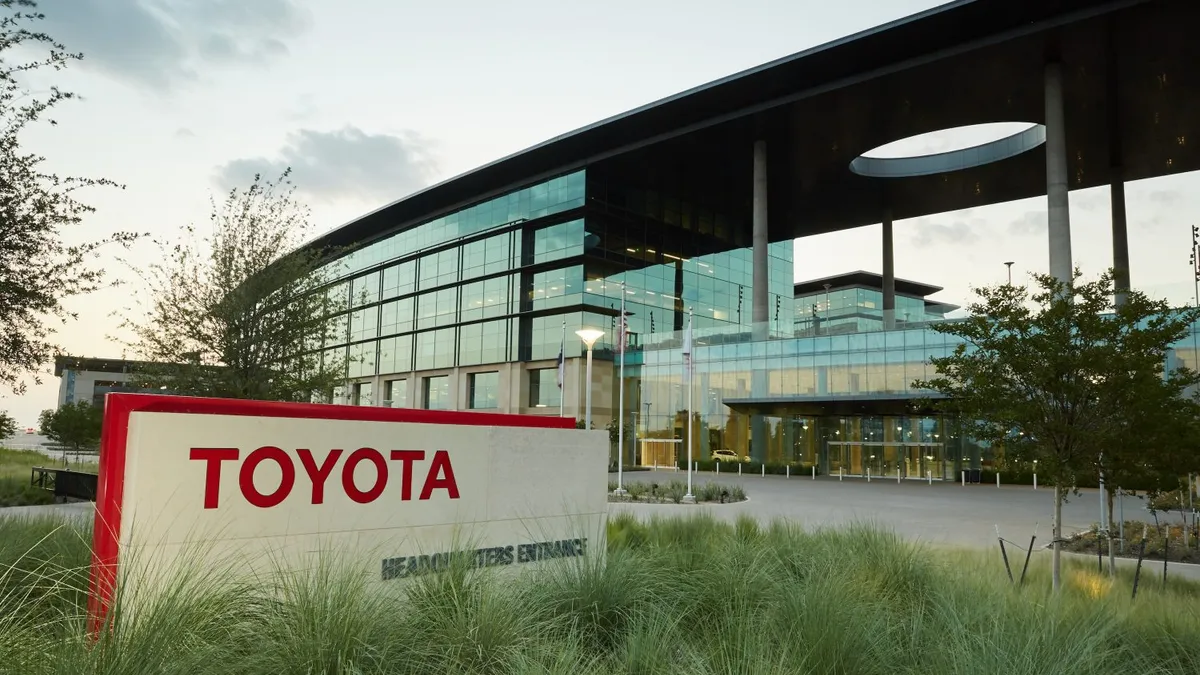Editor's note: With Super Bowl Sunday upon us, we wanted to revisit our interview with the NFL CIO Michelle McKenna. This year's game takes place in the two-year-old Mercedes-Benz Stadium in Atlanta, equipped with Wi-Fi and distributed antenna system capabilities so fans can stay connected the entire game.
The Super Bowl may be over, but the NFL never takes a break. With the 2018 draft starting Thursday, the next season is peering around the corner.
For the NFL's technology division, summer is the time to reassess the roadmap and decide what's in store for the coming season and years. This means figuring out how to preserve the traditions that fans have latched onto while moving the sport to the forefront of technology.
As the league works to improve baseline efficiency, it is also augmenting its data analytics, AI and omnichannel capabilities to drive fan engagement and experience. The 100th season is a little more than one year away, adding pressure for big projects and new milestones.
At the helm of this ship sits CIO Michelle McKenna, former CIO of Universal Orlando Resort, Constellation Energy and Centex. Now in her seventh season with the NFL, McKenna was the league's first CIO and has accumulated a wealth of wisdom about finding a career in technology, succeeding as a woman and what it takes to move a company forward in the digital age.
The path to the top is never straight
Like many CIOs, McKenna didn't start out in technology.
She began in finance and public accounting but, upon noticing a problem, began working with Disney's IT department to figure out how to get data out of old systems. Fast forward several years and McKenna found her niche in tech, marrying the business and technical sides.
"It's never been about recruiting women to start their careers, it's about having a workplace that allows them to have their life, motherhood and such — and also keep their career."

Michelle McKenna
CIO of the NFL
In the moment, it's easy to fear a job or responsibility change will move a career off track, but remaining open and flexible to opportunity can open entirely new paths to success.
"Sometimes if you're looking at a person's career, it looks just like if you look at a rock band that all of a sudden is super famous. You don't see all the nights they played in an empty house," said McKenna. And when changes do come around, a lateral move doesn't have to be a downward move for a career.
"If you look at male and female leaders [I think] women tend to be more willing to zigzag, therefore they tend to be really well-rounded, and that's what makes them so valuable in an organization," said McKenna. "Don't get caught up in the next title and the next promotion, try to round out your experience because your career ... it's not a sprint to the top."
Even CIOs who have made it to the top sometimes have to fight for a seat at the table. But as technology becomes entrenched throughout the business model, the presence and influence of CIOs in upper-level decision-making is more important.
"I think many CIOs have had to try to work themselves into the business. I was really the opposite. I came from the revenue side into technology as an enabler," said McKenna. "I've — pretty much my entire career — been very involved, reported [near] or directly to the CEO or COO of the companies that I've worked for."
As CIO of the NFL, there's still plenty of work to be done. Sports organizations are in the process of becoming technology leaders. With decades of player, game and fan data in store and now available for advanced analytic tools on the cloud, the game on the field and the logistics behind the scenes are changing. These technology changes have already swept across every department in the NFL.
"It takes people that are really interested in more than just hiring you, but setting you up for success no matter what that looks like."

Michelle McKenna
CIO of the NFL
"I think the leadership team here at the NFL saw the need for a CIO before it was obvious," said McKenna. "I had a little bit of convincing to do once I arrived here as to why, for example, would the tech team be involved on game day on the sideline."
In the past, football operations would handle most of the game-day action, but now with the integration of so much technology on and off the field, members of McKenna's team are at every game. During the season, they won't test any major systems, so most major overhauls or additions will take place during the offseason.
To continue bringing new levels of personalization for fans and insight for business, the NFL is investing in a technology workforce with relevant experience and bringing in enterprise partners like Amazon Web Services and Microsoft. But attracting and retaining the right kind of talent is a special challenge.
The secret sauce to success
McKenna may make the journey sound easy, but she's building on decades of business experience in a field that is primarily male, especially in the leadership ranks. That demographic is slowly changing as more women enter engineering and development, but the commitment to diversity is ongoing and far from over.
While the players are all male, it's a misperception that the NFL also has a male-dominated culture, according to McKenna. But just bringing women into the organization and removing the imbalance is not enough.
"I could take their technical ideas and turn it into a business plan and a business model ... that translation from technology speak to business speak, it has ended up being the secret sauce of my career."

Michelle McKenna
CIO of the NFL
"It's never been about recruiting women to start their careers, it's about having a workplace that allows them to have their life, motherhood and such — and also keep their career," said McKenna. For many women, careers can take off at the same time they are having a family; companies are finding flexibility, especially in terms of work arrangements, positions them to hold onto female workers and leadership.
Improving diversity also requires buy-in from the status quo. Bottom-up diversity initiatives can fall flat without the backing of leadership, and problem solving requires internal recognition and determination to change.
"I think one of the stories that really gets glossed over is we need men and we need them to be our advocates and mentors as well," said McKenna. "I've had many mentors throughout my life, and one of the things I feel most passionate about is most of them have been men and they have also been amazing advocates for me."
Having a mentor and an advocate in the workplace is highly recommended, and an asset McKenna credited for pushing her to give technology a try, making her realize she brought value and ensuring she had a seat at the table.
"It takes people that are really interested in more than just hiring you, but setting you up for success no matter what that looks like. That's the magic ingredient," she said. "And if you do that for your staff, meaning develop them well enough that they can even leave you and go on to bigger and better things — then you're doing the right thing, because then you'll keep attracting top talent."
"If you look at male and female leaders [I think] women tend to be more willing to zigzag, therefore they tend to be really well-rounded, and that's what makes them so valuable in an organization."

Michelle McKenna
CIO of the NFL
Inside the NFL's ranks, McKenna works to make sure employees are establishing important professional relationships — though outside of her leadership, which they "get enough of" daily. Senior tech leaders in the NFL take part in a mentorship program funded by the NFL and run through the CIO Executive Council that pairs them with other CIOs.
A good leader and mentor can make all the difference between a satisfactory and an extraordinary employee, helping to find voice and niche in an organization. Even for McKenna, it took time to recognize the weight of what she brought — and what a CIO brings to the C-suite is indispensable for any modern business with a digital footprint.
"I could take their technical ideas and turn it into a business plan and a business model that would get funded and sold within the organization, and that translation from technology speak to business speak, it has ended up being the secret sauce of my career," said McKenna.




















